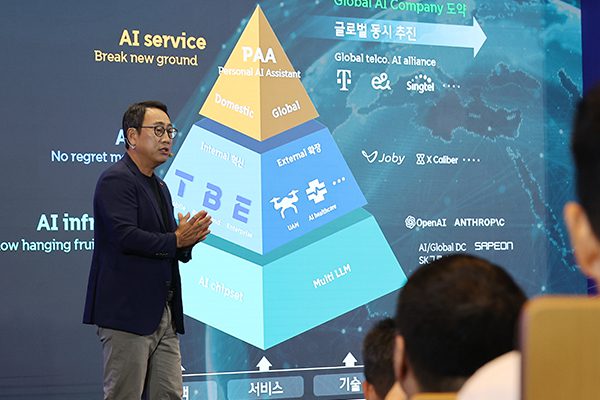TL;DR:
- SK telecom is set to launch an AI service, powered by a Large Language Model (LLM), with a focus on communication-related tasks.
- The service will include simultaneous two-way interpretation for Korean, English, Chinese, and Japanese languages.
- The company aims to differentiate itself in the global AI market by concentrating on communication-centric AI services.
- SK telecom plans to offer features like automatic scheduling during calls and summarization of key call content.
- A new AI sleep management service, featuring precise wake-up calls during the REM sleep stage, will be introduced.
- The company envisions offering AI personal assistant services, aiming to emulate the success of online video streaming subscriptions.
- SK telecom is actively collaborating with international telecom companies to expand its global presence.
- The development of technical elements for business-to-consumer (B2C) services, such as AI infrastructure and integration into existing businesses, is part of SK telecom’s strategy.
- The company has set ambitious financial targets, aiming to increase sales to 25 trillion won ($18.5 billion) in 2028, with a focus on quadrupling the share of AI business revenue.
Main AI News:
South Korea’s premier mobile carrier, SK telecom Co., is gearing up to launch a cutting-edge artificial intelligence (AI) service. This service will be powered by a Large Language Model (LLM) and will be tailored to excel in communication-focused tasks.
Unveiled during a recent announcement, SK telecom’s strategy revolves around offering a unique, communication-centric AI service. One of its standout features is simultaneous two-way interpretation across Korean, English, Chinese, and Japanese languages—a remarkable leap in the realm of linguistic versatility.
SK telecom’s President and Chief Executive Officer, Ryu Young-sang, noted, “ChatGPT’s debut in November 2022 triggered a massive AI revolution, and the majority of big tech companies, excluding Apple, are jumping onto the AI bandwagon. Regarding large language models (LLMs), three big groups have currently been formed—Google-Microsoft, OpenAI-Amazon, and Anthropic.”
These revelations were made during a high-profile event held in Seoul, where SK telecom outlined its vision to evolve into a globally acclaimed AI enterprise.
Rather than directly challenging the major tech giants, SK telecom has chosen a strategic path. The company aims to focus on communication-driven AI services, leveraging its unique strengths as a telecom provider.
Among the forthcoming services are the two-way simultaneous interpretation in Korean, English, Chinese, and Japanese, along with innovative features like automatic scheduling during calls and the ability to summarize critical call content. All of these services will be provided under SK telecom’s comprehensive AI platform, A dot.
Furthermore, SK telecom has plans to launch AI sleep management services starting this month. This novel service will feature wake-up calls precisely timed during the Rapid Eye Movement (REM) sleep stage—an optimal period for waking up refreshed.
Ryu stated, “Using communication-focused LLM-based AI services, our ultimate goal is to launch an AI personal assistant service. People will subscribe to two to three AI personal assistants, similar to subscribing to online video streaming services.”
SK telecom’s pivot towards AI personal assistant services stems from the transformation of the information technology (IT) industry landscape, with big tech companies like Google, Naver, and Netflix taking center stage since the 2010s. SK telecom believes that by riding the wave of the recent ChatGPT-driven AI revolution and delivering services that resonate with consumers, it can reestablish its leadership in the IT industry.
To achieve this ambitious goal, SK telecom is actively collaborating with international telecom companies in Germany, the United Arab Emirates, and Singapore, forming a united front to bolster its presence on the global AI stage.
Additionally, the company has outlined plans to develop the technical underpinnings necessary for its business-to-consumer (B2C) services, such as A dot, before divesting them. These efforts encompass AI infrastructure, including AI chips, AI data centers, and enhancements to LLM technology, collectively referred to as AIX. This involves integrating AI into existing businesses and pursuing Unmanned Aerial Mobility (UAM) endeavors. SK telecom has christened its LLM model for AI infrastructure as A.X LLM.
With its comprehensive AI strategy firmly in place, SK telecom has set ambitious financial targets. The company aims to achieve sales of 25 trillion won ($18.5 billion) in 2028, a substantial increase from 17 trillion won in 2022. It also plans to quadruple the share of AI business revenue, reaching 36 percent in 2028, up from 9 percent in 2022, while tripling its AI investment share, with total investments exceeding 4 trillion won last year. SK telecom’s strategic maneuvers in the AI arena are poised to redefine the landscape of the telecommunications industry.
Conclusion:
SK telecom’s strategic shift towards communication-centric AI services reflects a deliberate move to carve out a niche in the competitive global AI market. By leveraging its strengths as a telecom provider and embracing innovative AI solutions, SK telecom aims to reassert its leadership in the IT industry. The company’s partnerships with international telecom firms and aggressive expansion plans signal its intent to become a major player in the evolving AI landscape, potentially reshaping the telecommunications sector.

